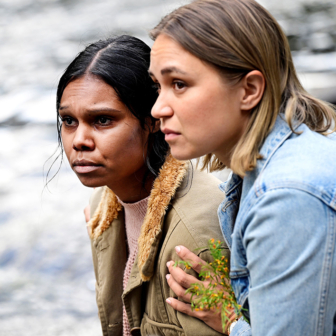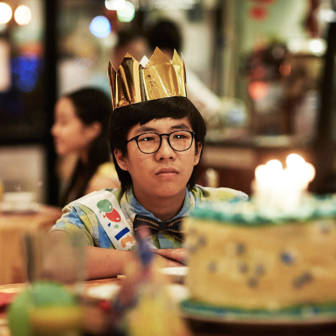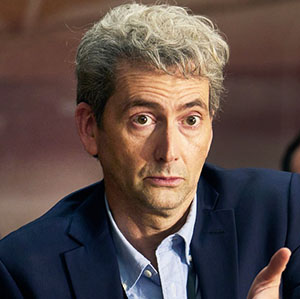A literature professor in an insignificant provincial college has a midlife crisis that threatens his marriage and career: try pitching that story to an agent or a producer in the television industry. It might help to mention that it’s based on a novel by Richard Russo, who won the 2002 Pulitzer Prize for another novel, Empire Falls, that was dramatised with some success.
But that was a while ago, and there’s nothing especially topical about Straight Man, the novel behind Lucky Hank (streaming on Stan). The commercial viability of this series rests almost entirely on the shoulders of its star, Bob Odenkirk, who took on the role as light relief after six seasons heading the cast of Better Call Saul, with Emmy nominations for all but one of them.
Odenkirk started out as a comedy writer for late-night television, then gained traction as an actor when his cameo appearance in Breaking Bad, a series sorely in need of lightening up, extended to forty-three episodes. As his character, Saul Goodman, evolved through the prequel, though, the shadows deepened until his adventurous defiance of fate was almost defeated. Almost.
With this new series, the bandwidth for adventure is narrower: there is no escaping one situation to create another, and Saul’s reckless mental energy is missing. As Hank negotiates his way through a series of semi-farcical debacles in the English department, his occasionally displayed anarchic streak is usually reined in.
This makes for some nicely managed comedy, bordering on farce. A contretemps with a student in the first episode almost leads to Hank’s removal as head of department, but just as he reconciles himself to the seeming inevitability his colleagues defeat their own purpose with a series of clueless stratagems, and they all find themselves back at square one.
“The English department is hilarious,” as showrunners Aaron Zelman and Paul Lieberstein observe. Having done time in a few of those myself, I can vouch for that, and for the agonies typically interwoven with the hilarity — though the stereotype of self-obsessed eccentrics clinging to an anachronistic comfort zone was already dated when the novel came out twenty-five years ago.
As the story progresses, a larger and more ruthless contemporary world impinges on Railton College. Hank’s dynamic wife Lily (Mireille Enos) has her eye on a career change that means a move to New York. A new college president (Kyle MacLachlan) introduces the neoliberal playbook with promises of swingeing cuts to teaching staff offset by lavish spending on publicity stunts and visits from celebrities.
These are ingredients for nicely executed vignettes. But presumably something more than the prospect of a minor diversion made executive producer Mark Johnson — whose credits include both Breaking Bad and Better Call Saul — hang on to the novel’s screenplay option for a quarter of a century. As some critics have observed, Russo has a way of drawing larger dramatic elements onto a small canvas.
A hint of this comes on the series poster, where the head of a wild goose impinges on an image of Hank posing for a somewhat staid portrait in front of the college. It’s a juxtaposition with particular resonance for devotees of television drama. In the opening episode of The Sopranos, the mafia boss has a panic attack as he watches a family of wild ducks fly off his swimming pool. One of the most quoted scenes in recent television history, it captures the paradox of a central character who’s as bad as they come yet finds himself called out by the innocence of animal life in a way that turns his world upside down.
It’s a flock of wild geese that provides the pivotal moment of psychological reckoning for Hank, and he experiences the impact in reverse. As a middle-aged family man — a small-town college professor with so little social authority he can’t even influence his students — he might be Tony Soprano’s polar opposite. Yet when the goose attacks, he fights back.
In both cases, the birds serve as avatars, bringing sudden awakening to a man estranged from his moral nature. When Hank goes on television to threaten a murderous campaign against the geese in retaliation for cuts to his department, it looks for a while as if he too might be breaking bad, but that’s not the genre here.
As Russo’s first-person narrator declares at the outset, “I’m in complete agreement with all those people who say, regarding movies, ‘I just want to be entertained.’” And, he adds, he is almost never entertained by what entertains other people. Which is all very well in a novel, where we temporarily take up residence inside the narrator’s head, but where does it leave the writing team on a screen dramatisation? What’s the register here? What are we laughing at?
There’s pathos with strong undertones of melancholy, offset by more than a touch of wackiness. And the episodes are built around comic situations of genuine originality, most of them devised by the scriptwriters with only a loose relationship to events in the book. Russo’s storylines run through the novel as a continuous braid, with little inherent dramatic structure, so it was necessary to take a free hand in the adaptation.
Among the things that don’t happen in the book is a visit to Railton by the celebrated writer George Saunders, which makes for a cleverly devised episode early in the series. The prospect of a public conversation with Saunders (who curiously isn’t played by the writer himself) provokes Hank’s sense of inadequacy along with some justified contempt for the world of celebrity authorship in which his own father played a significant role.
“What is it about writing that attracts so many dickheads?” he asks, but when the famous writer addresses the students, it is Hank who gets a lesson in the deft handling of egos. The staged conversation he has been dreading ultimately cuts through layers of accumulated resentment to moments of shared humour and insight that captivate the audience.
This fits brilliantly with Russo’s thematic references to Occam’s Razor — cutting directly to the heart of the matter — which Hank has adopted as a guiding metaphor. In subsequent episodes, the question of what will or will not cut it is subject to diverse comedic exploitation. It’s a subtle exercise from the showrunners’ point of view, but not so subtle as to frustrate viewers who just want to be entertained. •




